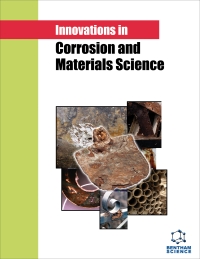-
s Effect of Organic Acids on the Electrochemical Migration of Tin in Thin Electrolyte Layer
- Source: Innovations in Corrosion and Materials Science (Discontinued), Volume 9, Issue 1, Apr 2019, p. 74 - 84
-
- 01 Apr 2019
Abstract
Background and Objective: The effects of representative solder flux residue weak organic acids on electrochemical migration (ECM) of tin in thin electrolyte layer were studied using a technique based on the coupling of in situ electrochemical measurements and optical observations, as well as ex situ characterizations. Methods and Results: The results showed that the increasing amount of weak organic acid decreased the probability of ECM and dendrites formed were mainly composed of metallic tin. Tin ions reacted with organic compound ions from hydrolysis of weak organic acids to form complexes with electronegativity, which retarded the transfer of tin ions. Some complexes can be oxidized to the insoluble tin oxides on the anode surface and blocked the dissolution of anode during tin ECM. Conclusion: The growth rate of tin dendrite was found to be limited by the dissociation of complexes. Mechanisms involved were proposed to explain the role of weak organic acid in the tin ECM.


